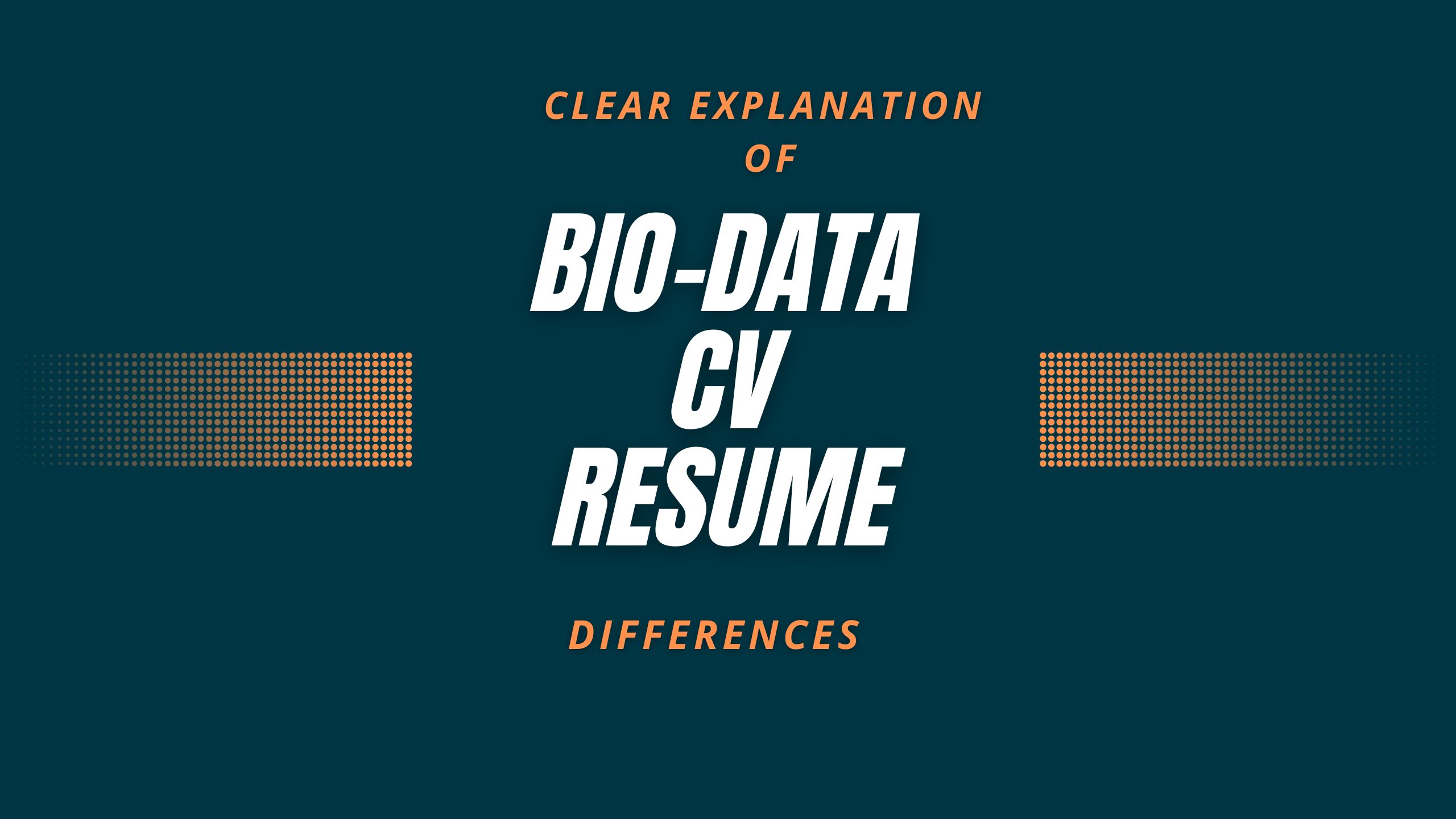What is the difference between bio-data and CV and resume

03 June 2023

Unraveling Bio-data, CVs, and Resumes: A Guide to Personal Documentation
Bio-data is a comprehensive document providing detailed personal and professional information, commonly used in South Asia. CV is a detailed document emphasizing academic and research achievements, while a resume is a concise document highlighting relevant skills and work experience tailored for specific job applications or industries.
In the realm of personal and professional documentation, different terms like bio-data, CV, and resume are often used, each serving a distinct purpose. Understanding the differences between these documents is crucial for effectively presenting one's background and qualifications in various contexts. Bio-data provides a comprehensive overview of personal and professional information, primarily used in South Asian countries. A CV, on the other hand, focuses on academic and research achievements, providing a detailed account of an individual's educational and professional journey. Meanwhile, a resume is a concise summary of an individual's skills and work experience, tailored to showcase their suitability for specific job opportunities or industries. This article delves into the nuances of bio-data, CVs, and resumes, exploring their unique features and purposes to help individuals navigate the diverse landscape of document presentation.
Idea in Brief
In this blog, we explore the different types of personal documentation - bio-data, CVs, and resumes - and their distinct purposes. Bio-data provides a comprehensive overview of personal and professional information, commonly used in South Asia. CVs focus on academic and research achievements, providing a detailed account of an individual's educational and professional journey. Resumes, on the other hand, offer a concise summary of skills and work experience, tailored for specific job applications or industries. Understanding these differences is essential for effectively presenting one's background and qualifications in various contexts.
Bio-Data
Bio-data is a comprehensive document that provides detailed information about an individual's personal and professional background. It typically includes essential personal details such as full name, gender, date of birth, marital status, nationality, and contact information. These details help in establishing the identity and basic background of the individual.
In addition to personal information, bio-data may also include sections such as educational qualifications, employment history, skills, hobbies, languages known, and references. These sections provide a broader view of the individual's educational background, work experience, and areas of expertise. The purpose of including these details is to offer a comprehensive overview of the individual's qualifications, achievements, and capabilities.
Bio-data is often used in various contexts, including job applications, marriage proposals, immigration procedures, or official documentation. It serves as a means for individuals to present their background information to prospective employers, potential life partners, or authorities, enabling them to make informed decisions based on the provided information. Overall, bio-data serves as a comprehensive snapshot of an individual's personal and professional profile, helping to establish their suitability for specific purposes or requirements.
CV(Curriculum Vitae)
A curriculum vitae (CV) is a detailed document that provides an in-depth summary of an individual's academic and professional achievements. It is commonly used in academic, scientific, or research-related fields. The purpose of a CV is to present a comprehensive overview of an individual's educational background, research experience, publications, presentations, professional affiliations, and other relevant information.
A CV typically includes sections such as contact information, education (listing degrees, institutions, dates, and any honors or awards received), research experience (highlighting projects, methodologies, and outcomes), publications (such as articles, papers, or books), conference presentations, teaching experience, grants or funding received, professional affiliations, and references. The level of detail provided in each section is much more extensive compared to a resume.
CVs are typically longer than resumes and are tailored to showcase an individual's academic achievements, research contributions, and professional accomplishments. They are often used when applying for academic positions, research grants, fellowships, or when submitting applications for graduate school or academic conferences. A well-crafted CV provides a comprehensive overview of an individual's qualifications and expertise in a specific field, helping to establish their credibility and suitability for academic or research-oriented roles.
Resume
A resume is a concise document that highlights an individual's relevant skills, work experience, and accomplishments. It is commonly used in business, corporate, or industry-specific applications. The purpose of a resume is to provide a snapshot of the individual's qualifications and suitability for a specific job or position.
A typical resume includes sections such as contact information, a summary or objective statement (a brief overview of career goals or the value the individual brings to the role), work experience (listing job titles, companies, dates, and key responsibilities or achievements), education (highlighting degrees or certifications obtained), skills (both technical and soft skills relevant to the job), and sometimes additional sections like certifications, achievements, or volunteer work.
Resumes are usually shorter than CVs and are tailored to highlight the most relevant information for the specific job or industry. They focus on showcasing an individual's professional experience, skills, and achievements that directly align with the requirements of the desired role. Resumes are typically submitted when applying for job openings, internships, or positions in the corporate world, where brevity and targeted information are essential for capturing the attention of employers and demonstrating the candidate's fit for the position.
Choosing the Right Path: Navigating Personal Documentation
In conclusion, being aware of the distinctions between bio-data, CVs, and resumes is crucial for effectively showcasing one's qualifications and experiences. Bio-data offers a comprehensive snapshot of an individual's personal and professional details, CVs delve into academic and research accomplishments, while resumes highlight relevant skills and work experience for specific job applications. By understanding the unique purposes and structures of these documents, individuals can present themselves in a tailored and impactful manner, increasing their chances of success in various personal and professional endeavors. Whether it's applying for a job, seeking research opportunities, or exploring potential life partners, choosing the appropriate document to present one's background and accomplishments is an important step towards making a strong and compelling impression.

